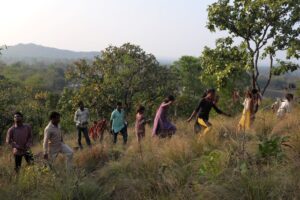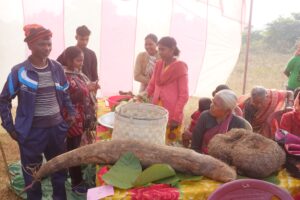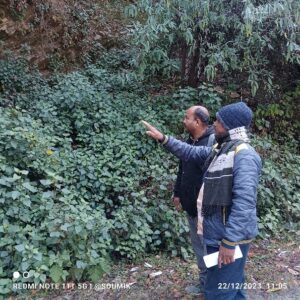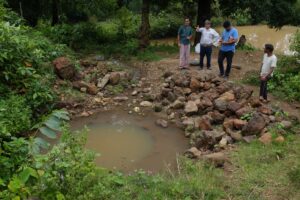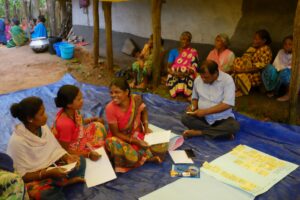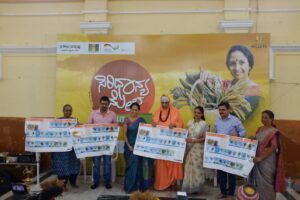Surja Paharia and Rohan Mukerjee
Through the Using Diversity project on the 16th of February 2022, a Mela was organised at Rakha village in the hills of Sundar Pahari to celebrate the traditional food traditions of the Paharia people and promote conservation and protection of the forest ecosystems of the region. The women and men of Rakha, Porkhani and Balami welcomed guests and inaugurated the event with a traditional dance and song.
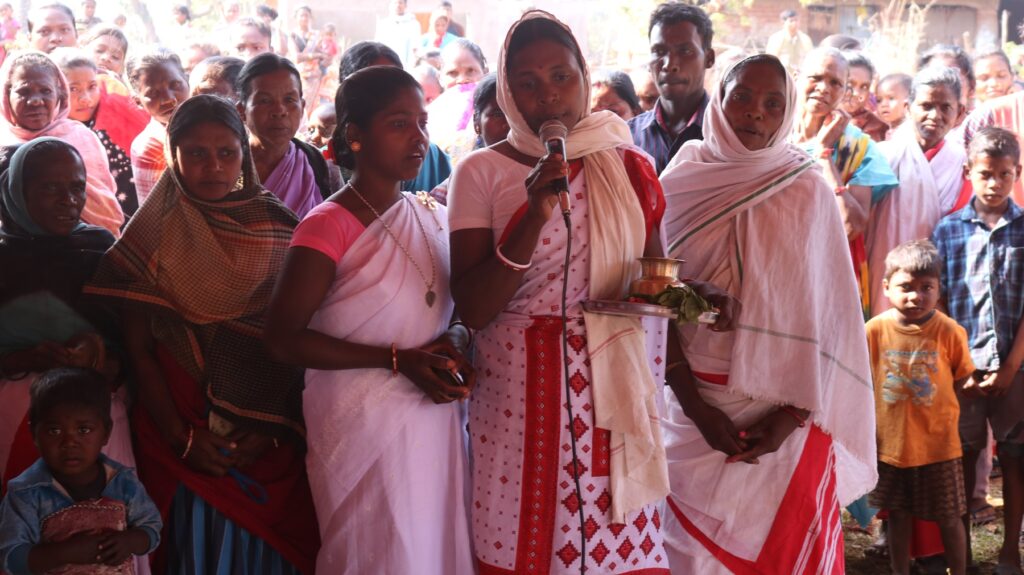
The program was chaired by Dharmendra Paharia from Bada Palma village. The principal focus was the problems posed by forest fires and what needs to be done to protect and safeguard the forest ecosystems of Sundar Pahari.
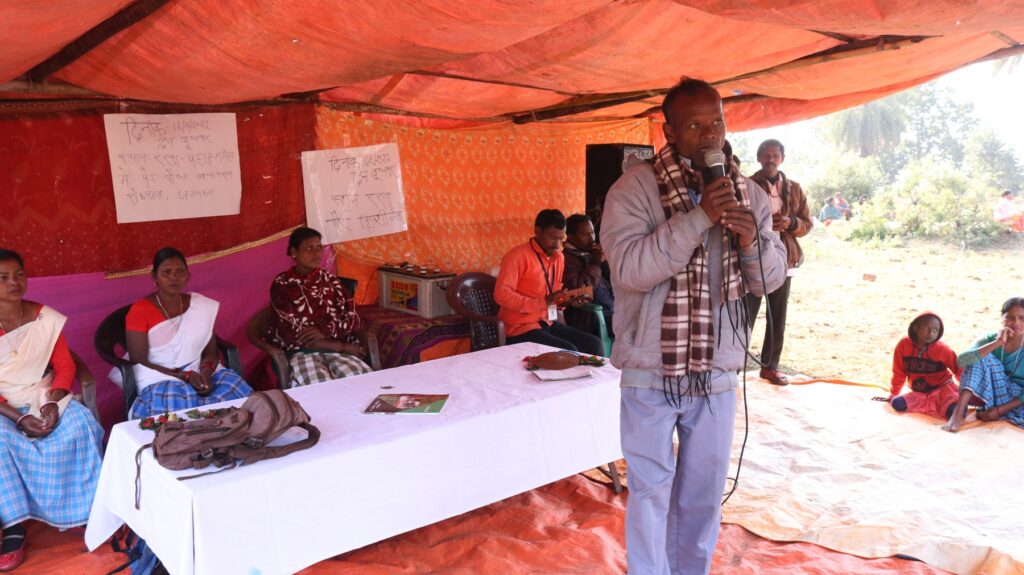
Dharmendra sought to highlight principal environmental and ecological challenges being faced by the Paharia people in Sundar Pahari. He himself spoke about the challenges posed by man made forest fires. He pointed out that the trees that make up the forests in Sundar Pahari start out as small saplings but forest fires destroy all the saplings and also cause considerable damage to older trees. This causes degradation of their forests and furthermore prevents essential natural regeneration. Another major negative impact of forest fires is the burning of leaf litter which serve as an invaluable natural manure, enriching the soil and promoting the growth of a diverse variety of trees and plants which are a source of food as well as livelihood in the form of various NTFPs that they provide. The wanton setting of unchecked fires is posing serious threats to the viability of the forest ecosystems that are the lifeline of the Paharia people. In this context Dharmendra encouraged everyone to come together to prevent the setting of fires, prohibit outsiders from starting fires and check and prevent spread of fire when it occurs. He asked his fellow Paharia people that if we don’t protect our forests and prevent unchecked fires then what will become of us, where will we go and how will we survive if the very soil and hill forests that we depend on are destroyed.
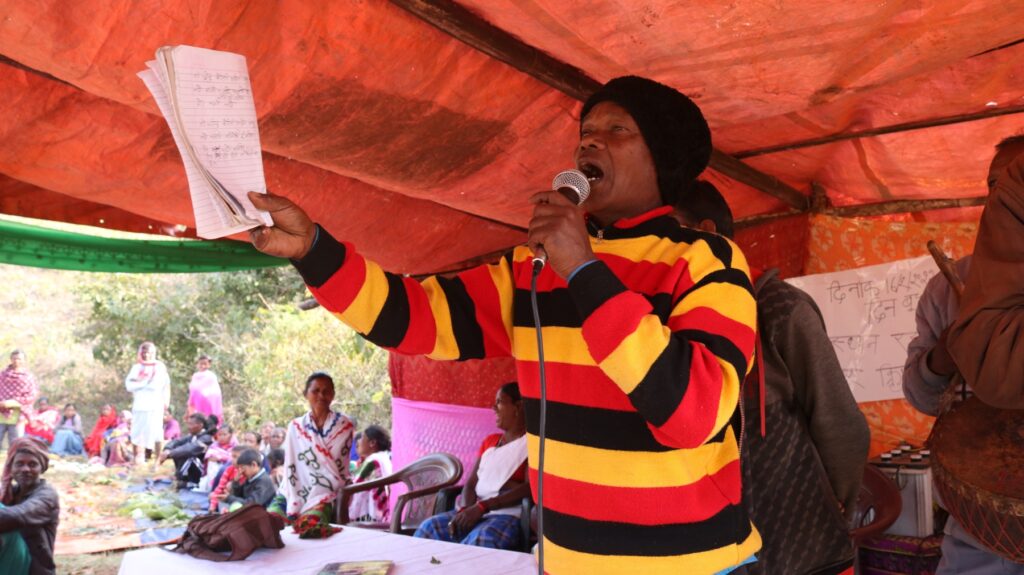
Dharmendra invited several men, women and groups from different villages across the region to share their thoughts and experiences with regards to these issues. Patras Paharia from Chamdade village presented a song on forest fires. He highlighted how the responsibility of preventing and checking the spread of forest fires in the areas under a particular village lie with traditional and customary heads and leaders like the Pradhan, Nadh, Kowar, Godith but there has been an erosion of these traditional positions and these leaders do not carry out their duty of preventing people from setting fires and checking fires in their village Jamabandi areas. Through his song Patras sought to raise awareness about this challenge and encourage the villagers to come together to revive traditional practices of protecting and safeguarding their forests from fires.
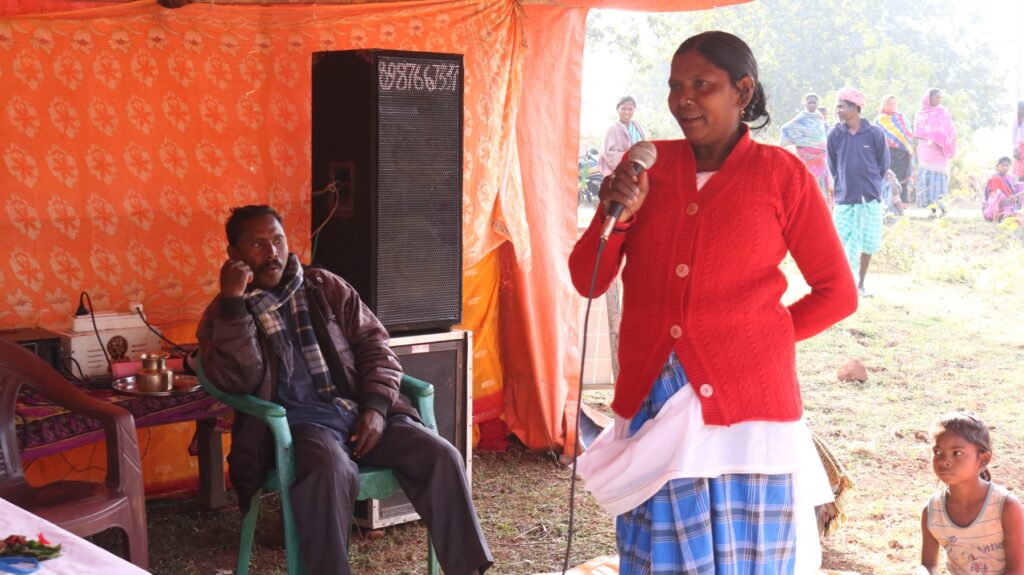
Sabni Paharin from Balami village shared challenges being faced with regards to functioning of groups and facilitating collective action in Paharia villages of Sundar Pahari. She shared that in the past there were no self help groups in Sundar Pahari but through the efforts of Soumik Banerjee (UD partner) many groups were formed. He encouraged the groups to save and provided capacity building, training and awareness to the groups on various different issues. However, not everyone absorbed what was imparted. Sabni pointed out that those who followed what was shared and built on it, have progressed while others have not. She pointed out that a few of them attend different meetings and programs and go back to their villages and try and share the information and knowledge with fellow villagers but many people are not listening to what they are sharing which poses a challenge to collective efforts to address problems being faced by their community as a whole. Sabni is also the Pradhan’s (village head’s) daughter and in the absence of any brothers is responsible for informing villagers about any intimation received by the Pradhan. Once again the lack of interest of some villagers poses a challenge to her in transmitting the information received to the village community.
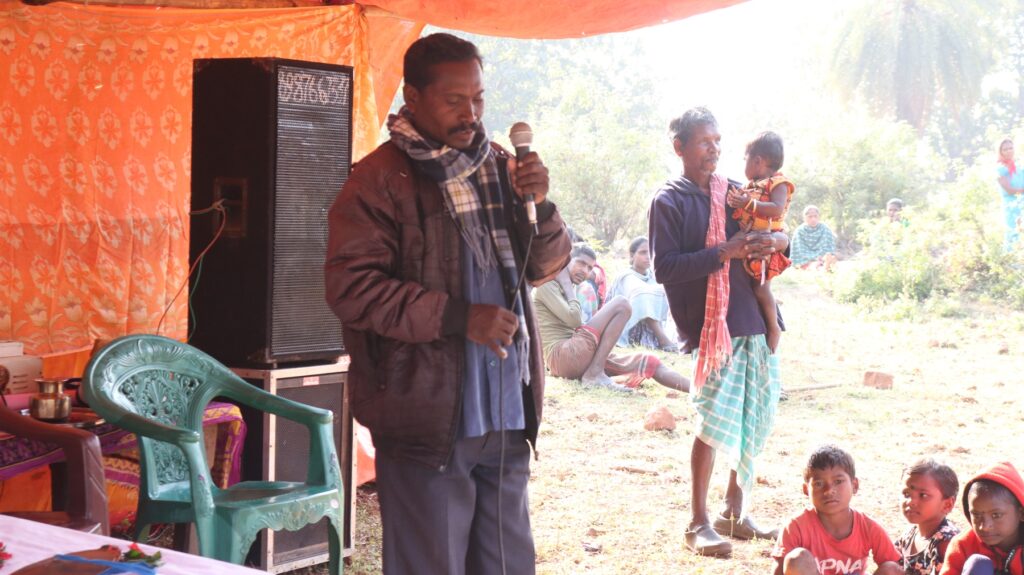
Vijay Paharia from Makhni Pahar village, Littipara Block, Pakur Distrct, talked about the erosion of knowledge and skills among the young to carry out traditional tasks and activities. The reason for this is that today’s children do not accompany their parents when they are engaged in different activities. In the past children acquired traditional knowledge like how to identify different wild foods and carry out agricultural activities by accompanying their parents to the forest and agricultural fields. As children of today do not attach much importance to their parents words and knowledge they are losing out on the traditional knowledge of the Paharia people. Vijay shared that his personal agricultural knowledge was acquired by accompanying his father when he ploughed their fields. That is how he learnt ploughing and many other things from his father. He ended by highlighting of learning everything from your parents and this should not be forgotten and the newer generation should strive to acquire traditional knowledge and skills by accompanying and listening to their parents.
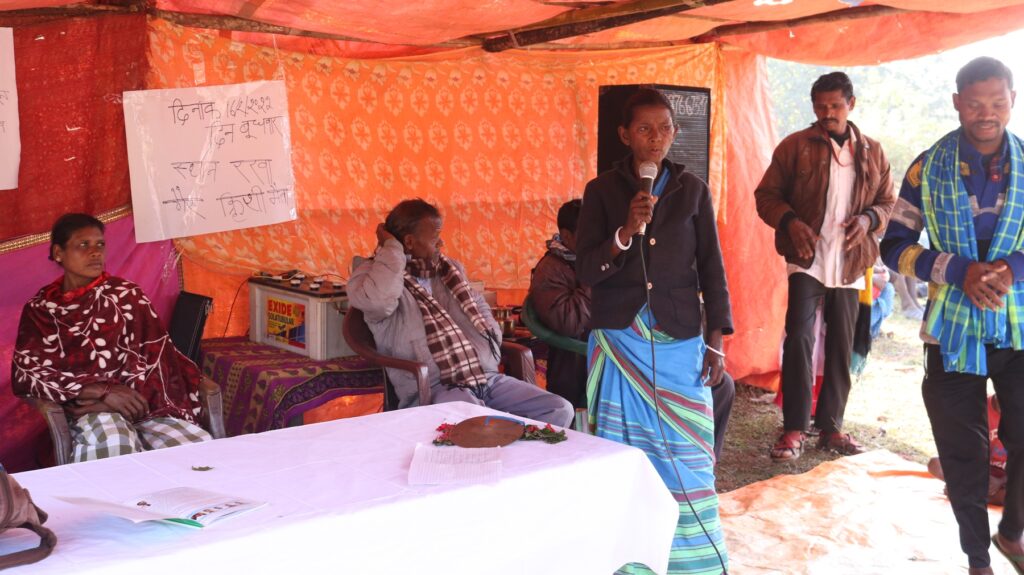
Nara Paharin a Swast Sahiya (Community Health worker) from Charcheri village shared that forests provide the Paharia people with many benefits, they are a source of oxygen, water, medicinal plants and wild food. However, forest fires are causing tremendous destruction to the forests of Sundar Pahari. In addition to burning of valuable trees a variety of medicinal plants and wild food plants like climbers of tubers are also destroyed by these fires. This is also resulting in an increase in scarcity of wild food which plays a vital role in helping the Paharia people meet their nutrition needs. She felt that there is an urgent need for the Paharia people across all generations to come together to understand the importance of forests and prevent forest fires. Children often roam the forest with matches intentionally or unintentionally starting fires, so we should instruct our children and discourage them from setting fires. She also pointed out that now that they get rice from the government through the PDS they are increasingly felling trees, but these trees should not be cut. When they weren’t getting rice from the government their ancestors protected and safeguarded so many trees. But now the Paharia people are unable to protect their trees and forests. Bearing in mind the many benefits of trees and forests all villages need to come together to understand these benefits and work for the protection of trees for future benefits.
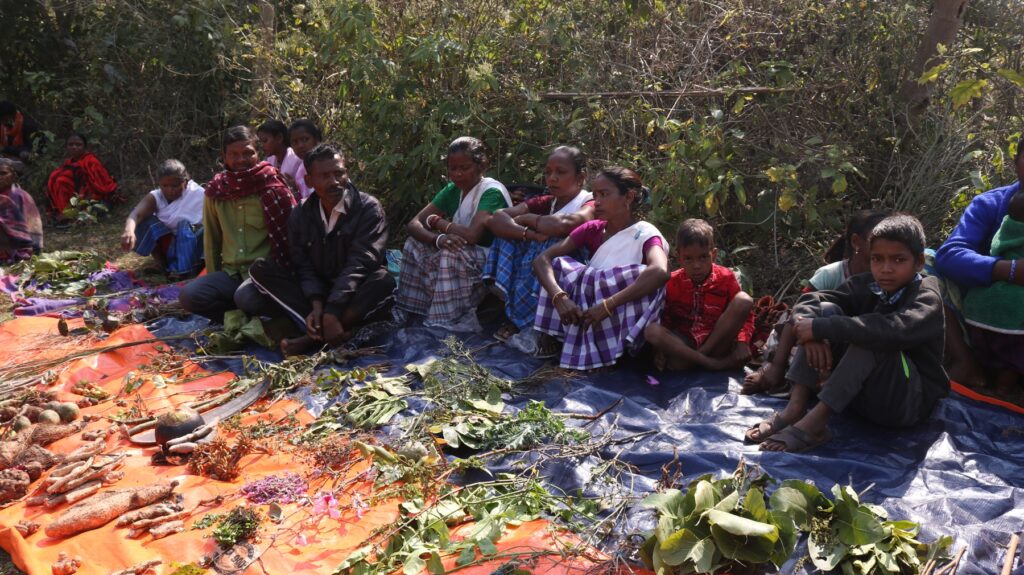
The program attracted over 300 women, men and children. Women with their children in tow turned out in large numbers and accounted for over 200 of the total participants. The main attraction of the event was a display of traditional food items and forest produced used by the Paharia people. Paharia women from across the area took responsibility for organising the exhibition. 146 women from 11 different villages brought a variety of different items for display which include wild tubers, green leafy vegetables, fruits, flowers, seeds, honeycombs, mushrooms, thatch grass, broom grass, datun (chew sticks).
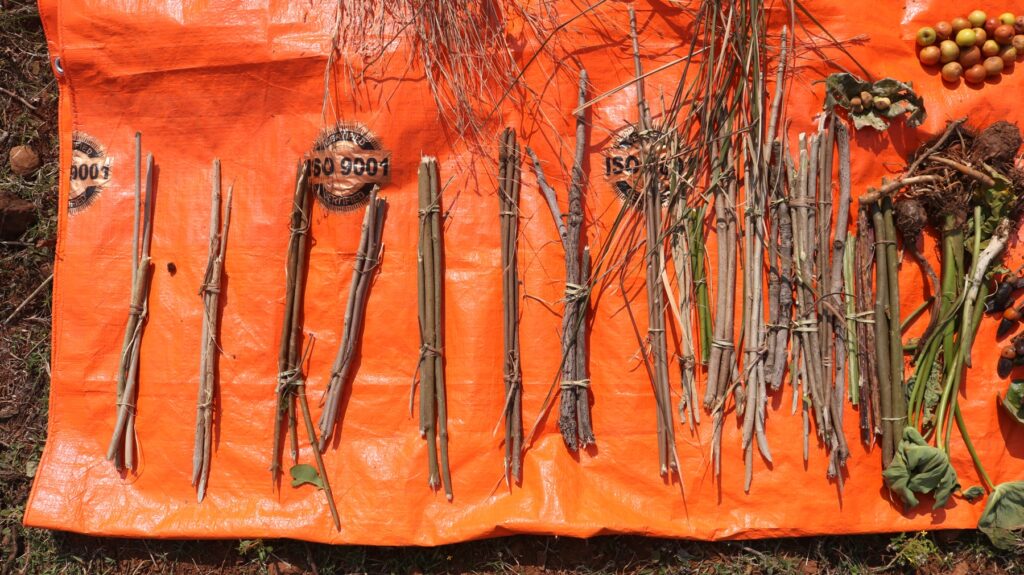
The rich diversity of agricultural and horticultural produce of the Paharia people was also on display and this included pulses, cereals, millets, maize, jackfruit, custard apples, Bel, drumstick, and guava. The maximum number of items were displayed by the group from Bada Palma village who had brough 104 different items. The exhibition helped facilitate a transfer and sharing of knowledge and regarding different foods and forest produce used by the Paharia people in different villages across Bada Paktari Panchayat and also highlighted some of the food items and forest produce that are becoming increasing rare thereby drawing attention to the need for conservation and restoration efforts. A display of posters on the wild food, agricultural practices and history of the Paharia attracted people of all ages with the villagers identifying and sharing their knowledge of the different photos.
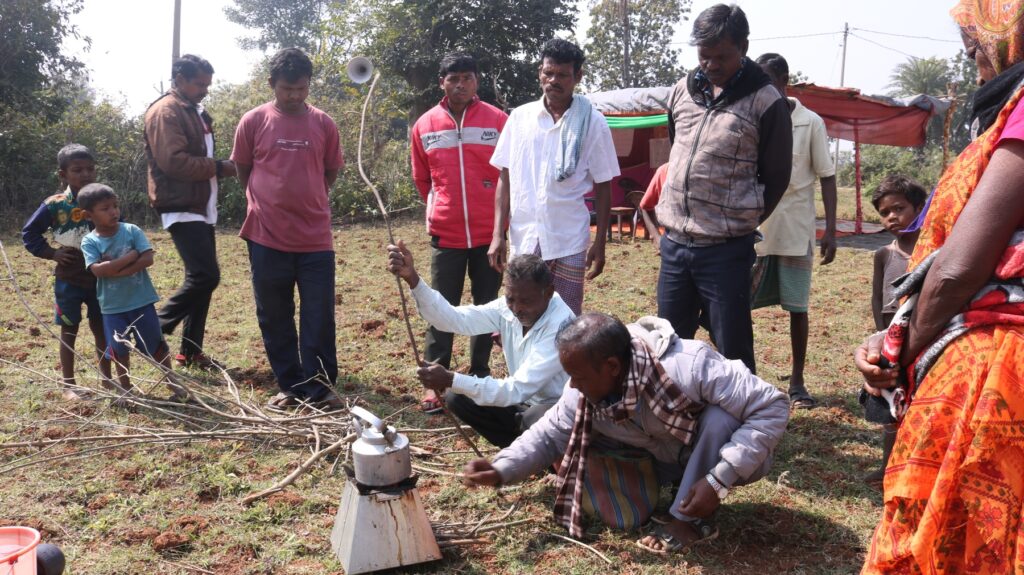
A demonstration of a fuelwood saving stove was conducted by Leta Paharia and Dharmendra Paharia. A number of these stoves have been distributed among Paharia families aimed at reduced the pressure for firewood on the region’s forests and feedback on the stoves was sought from the men and women present. The villagers shared that it would help if the size of the opening for firewood was increased by around 4 inches to accommodate larger pieces of firewood and they also felt that a larger stove top would help accommodate larger utensils.
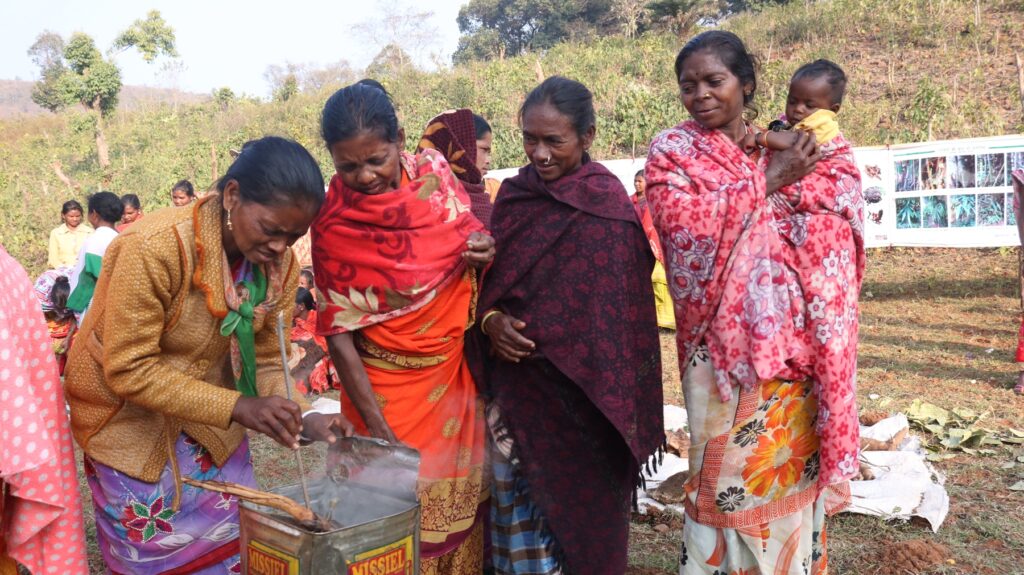
After everyone had explored the exhibits, the women boiled the wild tubers they had brought and shared it with those present.
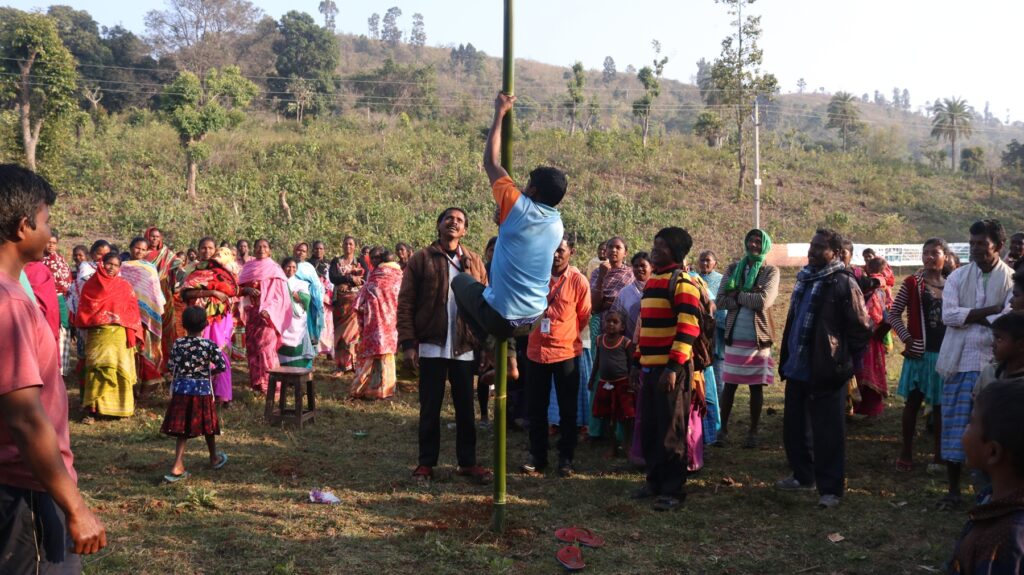
A climbing competition helped introduce an element of fun into the proceedings. A stripped, smooth banana trunk and a bamboo pole had been erected at the far end of the ground. Participants were challenged to climb the bamboo pole and banana trunk to claim the Rs. 100 and Rs. 200 cash prized placed atop each of them. In order to increase the level of difficulty the trunk and pole were generously greased with oil. Participants of all ages tried their hand enthusiastically cheered on by a throng of spectators. The activity was much harder than it initially looked, and it took a good 15 minutes before the prize atop the bamboo pole was claimed.
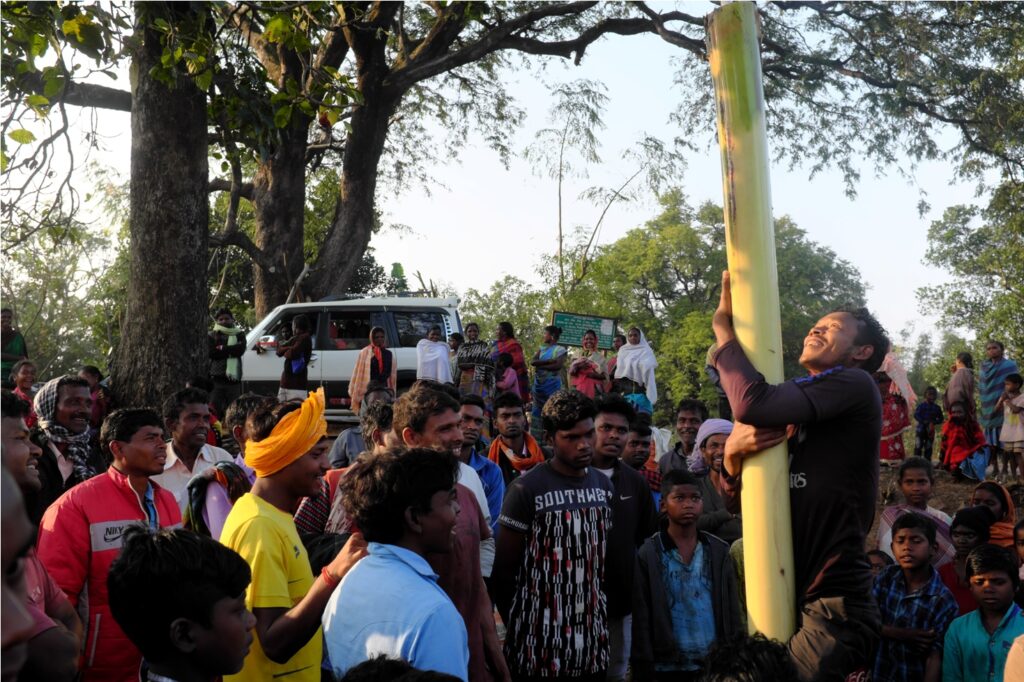
Though shorter the banana trunk was far more challenging due to its smoothness and just as the spectators were getting impatient Ganesh Paharia dug deep to reach the summit and claim the prize to a round of cheers from all present.
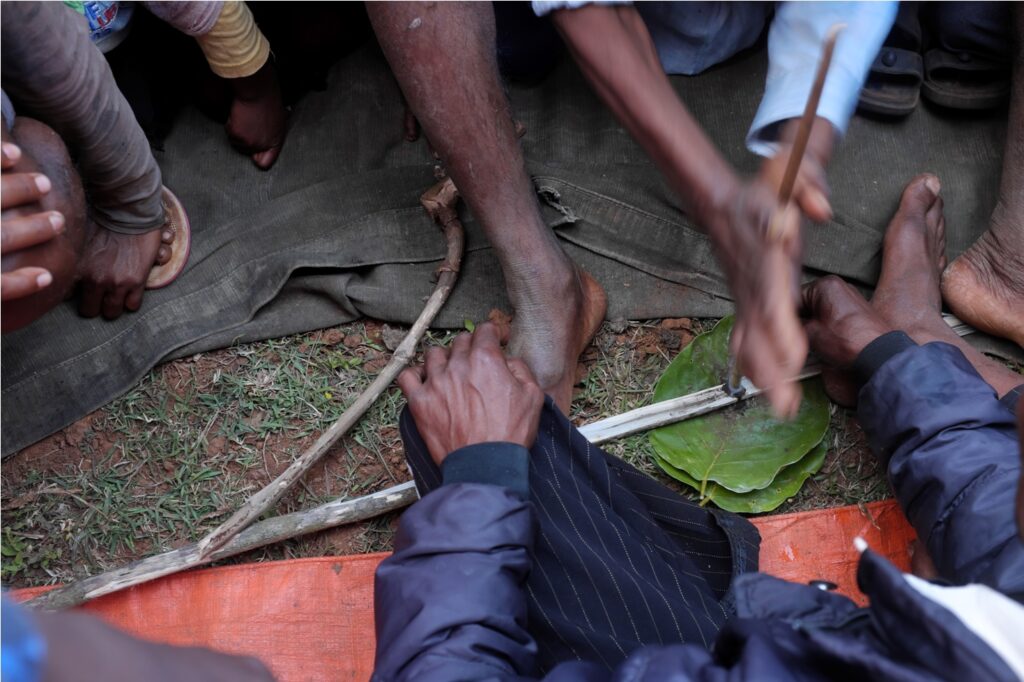
The event ended with the celebration of the traditional knowledge of the ancestors of today’s Paharia people through a demonstration of starting a fire without using matches using a traditional method of rubbing sticks together to get the flame started.


